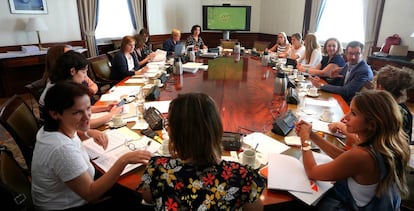Political parties reach landmark deal to combat gender violence
Groups agree on raft of 200 measures and a budget of €1bn in a bid to fight problem

Spain’s political parties on Monday sealed a historic agreement against gender violence that seeks to protect women and their children from the moment a doctor identifies any signs of abuse. So far this year, 32 women and six minors have been killed in gender violence-related cases, up from figures for 2016.

Political groups put their differences aside to draft the first sweeping agreement of the current Mariano Rajoy administration. Under the terms of the cross-party pact, €1 billion will be spent over the next five years to implement 200 measures, ranging from early-detection protocols at primary-care centers to specially trained police units, programs to fight sexism in school, and preferential access to some public subsidies for orphans.
The agreement also introduces measures to protect the victims of human trafficking and forced marriages
The deal was six months in the making and included input from 66 outside experts.
Article 1 posed the biggest challenge, as it includes conceptual issues that affect the rest of the document, such as the definition of what constitutes gender violence. The leftist Podemos party unsuccessfully lobbied to extend the concept beyond the realm of sentimental relationships, to include all manner of violence against women in any context.
The agreement also introduces measures to protect the victims of human trafficking and forced marriages.
The document will now go to Congress for debate and a vote on Friday. Starting on Monday, the government will have two months to sit down with local and regional officials to kickstart some of the new initiatives. A congressional committee will also be created to follow up on the pact’s progress.
200 measures
Some of the measures included in the pact are:
- Women may be considered victims of gender violence even if they have not filed a criminal complaint yet.
- Emergency rooms and primary-care centers will develop early detection protocols to identify potential victims.
- Children of women who are killed by their partners will receive psychological and educational assistance. They will get priority access to public orphan pensions and grants.
- Confessing to the crime and repairing the damage will no longer be considered an extenuating circumstance.
- Cross-disciplinary support units will be sent out to follow each case and prevent further risk of aggression.
- Trained police officers will be available 24/7 to assist victims.
- Schools will encourage initiatives to fight sexism, and history books will include the feminist movement.
- A Code of Non-Sexist Advertising is in the pipeline. A watchdog agency, the Observatorio de la Imagen de las Mujeres, will report discriminatory content in the media.
English version by Susana Urra.
Tu suscripción se está usando en otro dispositivo
¿Quieres añadir otro usuario a tu suscripción?
Si continúas leyendo en este dispositivo, no se podrá leer en el otro.
FlechaTu suscripción se está usando en otro dispositivo y solo puedes acceder a EL PAÍS desde un dispositivo a la vez.
Si quieres compartir tu cuenta, cambia tu suscripción a la modalidad Premium, así podrás añadir otro usuario. Cada uno accederá con su propia cuenta de email, lo que os permitirá personalizar vuestra experiencia en EL PAÍS.
¿Tienes una suscripción de empresa? Accede aquí para contratar más cuentas.
En el caso de no saber quién está usando tu cuenta, te recomendamos cambiar tu contraseña aquí.
Si decides continuar compartiendo tu cuenta, este mensaje se mostrará en tu dispositivo y en el de la otra persona que está usando tu cuenta de forma indefinida, afectando a tu experiencia de lectura. Puedes consultar aquí los términos y condiciones de la suscripción digital.








































